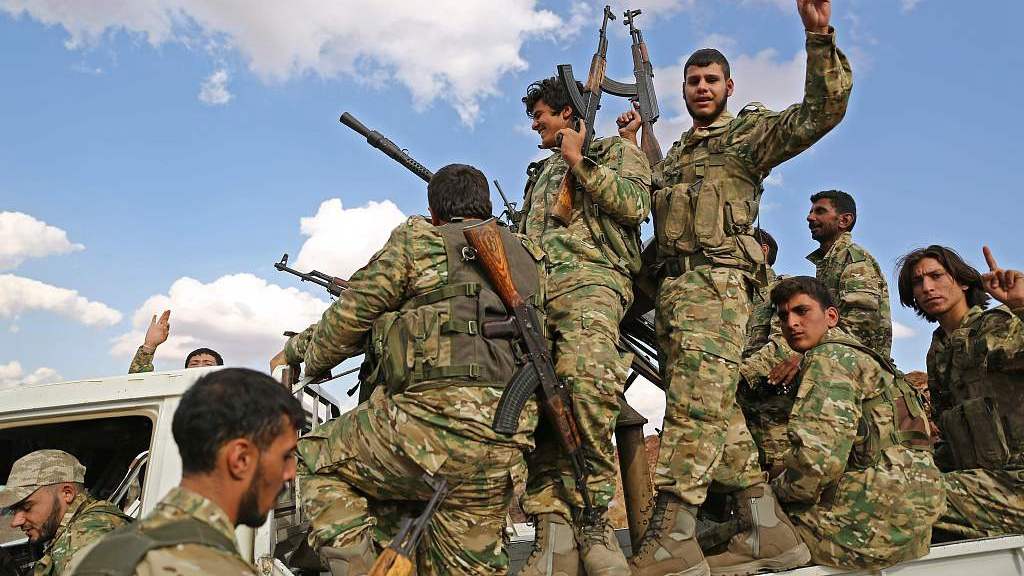
Turkish-backed Syrian rebel fighters gather near the Syrian-Turkish border north of Aleppo, October 7, 2019. /VCG Photo
Turkish-backed Syrian rebel fighters gather near the Syrian-Turkish border north of Aleppo, October 7, 2019. /VCG Photo
Editor's Note: Tom Fowdy is a British political and international relations analyst and a graduate of Durham and Oxford universities. He writes on topics pertaining to China, the DPRK, Britain, and the United States. The article reflects the author's opinions and not necessarily the views of CGTN.
On Monday, the United States announced that they had given the green light to a Turkish military operation in northern Syria, permitting Ankara to invade the country and establish a buffer zone across its northeastern border, which has been controlled by Kurdish militias under the coalition of the "Syrian Democratic Forces" (SDF).
In the process, U.S. President Donald Trump announced that the United States would be partially withdrawing their military presence from that particular area, with over 2000 U.S. troops having illegally been stationed in northern Syria as part of a broader campaign against ISIL.
In doing so Trump vowed to bring an end to "needless wars" and allow the region to sort out its own problems. However, events soon grew complicated. As per his last pledge to withdraw from Syria, the president found soon himself under heavy criticism from the American foreign policy establishment. Senate Leader Mitch McConnell stated he was handing Syria to Iran and Russia, with other leading senators such as Marco Rubio and Mitt Romney also launching attacks.
Additionally, the SDF accused the president of "stabbing them in the back" and betrayal. The backlash eventually led Trump to deny it was a "full withdrawal" and then go into a tirade against Turkey's Recep Tayyip Erdogan, threatening on Twitter to "totally destroy and obliterate the economy of Turkey" if they do anything he considers to be "off limits."
What exactly is going on here? This is a complicated situation which requires several levels and areas of analysis. First of all, the United States has long been wrangling with Turkey over the Syrian border situation. The presence of Kurdish forces there is unacceptable to Ankara's national interests. This emerged as part of the campaign against ISIL.

Turkish-backed Syrian fighters gather near the Syrian-Turkish border north of Aleppo, October 7, 2019. /VCG Photo
Turkish-backed Syrian fighters gather near the Syrian-Turkish border north of Aleppo, October 7, 2019. /VCG Photo
However, this is in direct contradiction to the U.S. foreign policy establishment's ambition to maintain a permanent presence in Syria and thus increase the projection of American power in the region. On a domestic level, Trump's ambition to leave the country is being continually resisted by those around him. However, the sudden resurgence of this dispute must be understood on the personal level of Trump himself – he's using this as an obvious distraction to steer coverage away from impeachment.
Now the regional level: extreme conflict and instability in Syria in the early 2010s sparked the rise of ISIL, which went on to occupy swathes of the country. As this was happening, Western powers sought to remove the country's leader Bashar al-Assad from power. To do so, they lent their support to Kurdish militias in the north of the country under a coalition known as the "Syrian Democratic Forces" supported by U.S. troops. The coalition was a success, wiping out ISIL's "caliphate" and leaving a swathe of northern Syria under their control, giving the U.S. a direct strategic stake.
However, this development proved antagonistic to Turkey. Ankara, which is locked in a constant ethnic struggle against its own Kurdish minority, now found Kurdish forces on its own border with the ability to supply the internal PKK insurgency.
Turkey's Erdogan has repeatedly lobbied Washington to intervene and remove the Kurds from the border. The U.S. foreign policy elites want to keep America's presence there and support the Kurds despite Turkey's demands, but Trump wants to leave as he sees it as an unnecessary distraction. When he tried to withdraw late last year, there was a systematic backlash against him and his defense secretary resigned in protest.
But why has he rekindled this now in such an abrupt way? The obvious answer is that this is a deliberate distraction, a tactic Trump frequently uses to steer negative coverage away from him, usually by causing new controversies. As the impeachment inquiry at home gathers momentum, pressure on Trump is subsequently increasing, forcing him to make absurd and erratic moves to distract coverage away from this matter. For the short term it appears to have worked, Congress and the media are all talking about Syria – news of the "second whistleblower" who recently emerged appears to have been buried.
Thus as a whole, this is a very complex and multi-dimensional crisis. Assessing each level of analysis is crucial to understanding the bigger picture. It has long-term roots, including the recent frictions in Washington-Ankara relations, debates over the strategic role of Syria in American foreign policy and how Trump's own vision has long contradicted such. However, we cannot conceive the sudden re-emergence of this issue without taking into account Trump's own personal playbook. These contradictory, extreme and bizarre statements are the deliberate product of a man under pressure, and in this case one must worry and wonder what he will try next.
(If you want to contribute and have specific expertise, please contact us at opinions@cgtn.com.)